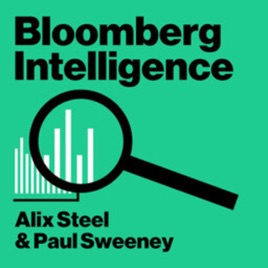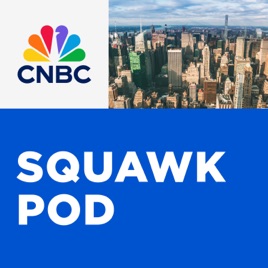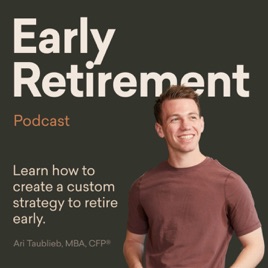
Advertise on podcast: The Rational Reminder Podcast
Rating
4.9 from
Country
This podcast has
314 episodes
Language
Publisher
Explicit
No
Date created
2018/08/14
Average duration
72 min.
Release period
7 days
Description
A weekly reality check on sensible investing and financial decision-making, from two Canadians. Hosted by Benjamin Felix and Cameron Passmore, Portfolio Managers at PWL Capital.
Podcast episodes
Check latest episodes from The Rational Reminder Podcast podcast
Eric Balchunas: Spot Bitcoin ETFs
2024/02/22
After a year and a half hiatus from discussing Bitcoin, we felt compelled to explore the implications of the US Securities and Exchange Commission's approval of 10 spot Bitcoin ETFs for trading. In this episode, we dive into the recent news surrounding Bitcoin and its entry into the mainstream investment landscape through spot Bitcoin ETFs. To help us unpack this topic is Eric Balchunas, a seasoned ETF analyst at Bloomberg Intelligence and host of the Trillions Podcast. Eric brings a wealth of knowledge on ETFs and offers valuable insights into the intersection between traditional financial markets and the cryptocurrency space. Join us as we discuss the implications of Bitcoin ETFs trading on regulated exchanges and the impact on its overall anti-establishment identity, the intricacies of approved cash creation and redemption limitations, what Bitcoin ETFs are backed by, the transparency and potential vulnerabilities of Bitwise, and the complexities of navigating anti-money laundering aspects within Bitcoin transactions. You’ll learn how financial advisors are likely to leverage spot Bitcoin ETFs, who stands to benefit the most from Bitcoin ETFs, the broader implications for the investment landscape, why Bitcoin is like Tabasco sauce, and more! Tune in for a captivating exploration of Bitcoin's journey into the mainstream investment arena, with Eric Balchunas.
Key Points From This Episode:
(0:04:29) Reasons that Canada officially embraced Bitcoin sooner than the USA. (0:05:55) Why spot Bitcoin ETFs took longer to be approved by the SEC than futures ETFs. (0:07:54) Which ETF regulations have changed to allow a spot Bitcoin ETF. (0:09:42) Approved cash creation and redemption limitations. (0:12:46) What spot Bitcoin EFTs are backed by. (0:17:15) Bitwise: how it demonstrates transparency and the potential for sabotage. (0:19:38) How authorized participants will deal with anti-money laundering aspects of Bitcoin transactions. (0:21:31) How spot Bitcoin ETFs have been trading relative to their net asset value. (0:22:42) The amount of value flowing into Bitcoin ETFs. (0:27:23) Differentiating Newborn Nine ETFs from one another. (0:31:57) Benefits of Bitcoin being made available through an ETF. (0:34:21) The impact spot Bitcoin ETFs have had on Bitcoin's identity. (0:38:04) Who has benefited the most from the adoption of spot Bitcoin ETFs. (0:40:36) Comparing spot ETFs starting trade to what was predicted by crypto enthusiasts. (0:44:36) Vanguard's decision to not allow the spot Bitcoin ETFs on their platform. (0:48:19)How financial advisors will leverage spot Bitcoin ETFs.
Links From Today’s Episode:
Rational Reminder on iTunes — https://itunes.apple.com/ca/podcast/the-rational-reminder-podcast/id1426530582.
Rational Reminder Website — https://rationalreminder.ca/
Rational Reminder on Instagram — https://www.instagram.com/rationalreminder/
Rational Reminder on X — https://twitter.com/RationalRemind
Rational Reminder on YouTube — https://www.youtube.com/channel/
Rational Reminder Email — info@rationalreminder.ca
Benjamin Felix — https://www.pwlcapital.com/author/benjamin-felix/
Benjamin on X — https://twitter.com/benjaminwfelix
Benjamin on LinkedIn — https://www.linkedin.com/in/benjaminwfelix/
Cameron Passmore — https://www.pwlcapital.com/profile/cameron-passmore/
Cameron on X — https://twitter.com/CameronPassmore
Cameron on LinkedIn — https://www.linkedin.com/in/cameronpassmore/
Eric Balchunas on LinkedIn — https://www.linkedin.com/in/ericbalchunas/
Eric Balchunas on X — https://twitter.com/EricBalchunas
Bloomberg — https://www.bloomberg.com/
Trillions — https://www.bloomberg.com/podcasts/series/trillions
U.S. Securities and Exchange Commission — https://www.sec.gov/
Bitwise — https://bitwiseinvestments.com/
Bitwise Bitcoin ETF — https://www.sec.gov/Archives/edgar/data/1763415/000199937124000346/bitcoin-424b3_011024.htm
Coi
more
Rob Copeland: Ray Dalio and Bridgewater
2024/02/15
In this episode, we welcome Rob Copeland, author of the recently released book The Fund: Ray Dalio, Bridgewater Associates, and the Unraveling of a Wall Street Legend. Rob, a finance reporter for The New York Times, provides a gripping account of the rise and unravelling of Ray Dalio and Bridgewater Associates. Bridgewater Associates, one of the prominent hedge funds on the planet, is synonymous with the legendary investor Ray Dalio. In our conversation, we delve into the intricacies of the company's investment portfolio, shedding light on the details that contribute to its success, and dissect Ray's supposedly revolutionary model of economic cycles. Discover the unconventional principles that shape Bridgewater's culture, from believability to radical transparency, and get a sneak peek into the bizarre Dot Collector app that fuels the company's operations. Gain insights into employee experiences at the company, the secret sauce to Ray’s success, the company’s track record in predicting market crashes, undisclosed aspects of Ray’s success story, and much more! Tune in now!
Key Points From This Episode:
Details about the company’s investment management portfolio. (0:06:38) Dalio's model of economic cycles’ influence on the company’s investment approach. (0:09:13) Exploring the criticism toward Dalio's model of economic cycles. (0:10:13) How successful Dalio has been at predicting market crashes. (0:12:21) Bridgewater’s investment success track record. (0:14:40) Unpacking Dalio's principles and how he developed them. (0:16:16) Uncovering how Dalio's principles are perceived within Bridgewater and how they made the company successful. (0:18:56) Learn how believability and radical transparency work within Bridgewater. (0:20:58) The bizarre Dot Collector app and how the company leverages it. (0:24:57) Employees’ experiences of working at Bridgewater. (0:28:02) Rob’s opinion about Ray and how he compares to other hedge fund managers. (0:29:38) Hear about undisclosed aspects of Ray's success story. (0:34:52) Dalio and readers’ reactions since publishing the book. (0:37:17) Delving into the nuance factors explaining Bridgewater's success as a business. (0:40:18) How the company will continue to function post-Ray Dalio. (0:43:06) What Rob hopes readers will take away after reading the book. (0:44:55)
Links From Today’s Episode:
Rob Copeland on LinkedIn — https://www.linkedin.com/in/real-rob-copeland/
Rob Copeland on X — https://twitter.com/realrobcopeland
The New York Times — https://www.nytimes.com/
The Fund — https://static.macmillan.com/static/smp/the-fund/
Bridgewater Associates — https://www.bridgewater.com/
Principles — https://www.amazon.com/Principles-Life-Work-Ray-Dalio/dp/1501124021
Doom: The Politics of Catastrophe — https://www.amazon.com/Doom-Politics-Catastrophe-Niall-Ferguson/dp/0593297377
The Dot Collector — https://www.principles.com/principles/3290232e-6bca-4585-a4f6-66874aefce30/
Rational Reminder on iTunes — https://itunes.apple.com/ca/podcast/the-rational-reminder-podcast/id1426530582.
Rational Reminder Website — https://rationalreminder.ca/
Rational Reminder on Instagram — https://www.instagram.com/rationalreminder/
Rational Reminder on X — https://twitter.com/RationalRemind
Rational Reminder on YouTube — https://www.youtube.com/channel/
Rational Reminder Email — info@rationalreminder.ca
Benjamin Felix — https://www.pwlcapital.com/author/benjamin-felix/
Benjamin on X — https://twitter.com/benjaminwfelix
Benjamin on LinkedIn — https://www.linkedin.com/in/benjaminwfelix/
Cameron Passmore — https://www.pwlcapital.com/profile/cameron-passmore/
Cameron on X — https://twitter.com/CameronPassmore
Cameron on LinkedIn — https://www.linkedin.com/in/cameronpassmore/
more
The Quant Winter, and is Canada Pension Plan a Scam?
2024/02/08
Are you ready for a deep dive into quantitative investing, the private credit trend, and the Canada Pension Plan (CPP)? Then this episode is for you! Joining us today is Robin Wigglesworth, The Financial Times’ global finance correspondent, and author of Trillions: How a Band of Wall Street Renegades Invented the Index Fund and Changed Finance Forever, a groundbreaking book about the past, present, and future of passive investing. We talk with Robin about quantitative investing and the ideas he lays out in his article ‘A Quant Winter’s Tale’, before hearing his insights on the private credit trend and his intriguing new book titled Bonds, all about the history of the bond market. Today’s episode also features our Mark to Market segment, where Mark McGrath joins us to talk about the Canada Pension Plan (CPP), providing a comprehensive overview of its inner workings, his response to the criticisms levelled against it, and why he believes it’s of huge benefit to a great many Canadians. Next, we take a look back at our conversation with Alexandra Macqueen on annuities before sharing our thoughts on its relevance to today’s discussion and why it’s worth revisiting. Be sure to stay tuned for our after-show segment where we share our book, blog, and viewing recommendations, plus our favourite reviews, followed by a sneak peek of some of the exciting guests we have coming up. Press play now for a deep dive into quant investing, the hype around private credit, saving for retirement, and a whole lot more!
Key Points From This Episode:
An introduction to today’s guest, Robin Wigglesworth, followed by his breakdown of quantitative investing. (0:04:05) Theories on what happened to factor investing between 2018 and 2020; what is meant by the quant winter and why we are now in a quant summer. (0:09:59) How investor sentiment regarding factor investing changed after the quant winter and how the algorithm aversion phenomenon impacted it. (0:15:13) The collapse of value; the impact of the COVID-19 pandemic (plus its role in the quant winter), and where we are right now. (0:20:14) An overview of quant investing products, and why many of them are too expensive. (0:23:24) Breaking down the noisy-ness in factor data and Robin’s predictions for where factor investing will go from here. (0:25:51) Unpacking the hype around private credit: indications that it’s in a bubble, how it could impact broader trends, and who stands to benefit most. (0:36:36) We hear about the fascinating book that Robin is currently working on about the history of the bond market. (0:40:22) Our Mark to Market segment on the complicated (and divisive) Canada Pension Plan (CPP); how it works, its profound benefits, and responding to the criticism it has received. (0:41:50) A look back at our conversation with Alexandra Macqueen on annuities and how it links in with today’s discussion. (01:01:31) Our after-show section: an update on the Money Scope Podcast, reading recommendations, reviews from our listeners, and some of the incredible guests we have coming up! (01:04:33)
Links From Today’s Episode:
Robin Wigglesworth — https://robinwigglesworth.com/
Robin Wigglesworth on LinkedIn — https://www.linkedin.com/in/robin-wigglesworth-17101722
Financial Times — https://www.ft.com/
Trillions: How a Band of Wall Street Renegades Invented the Index Fund and Changed Finance Forever — https://www.amazon.com/Trillions-Renegades-Invented-Changed-Finance/dp/0593087682
‘Quant Winter's Tale’ — https://www.ft.com/content/e0f98278-432e-4ece-b170-2c40e40d2835
Episode 184: Robin Wigglesworth — https://rationalreminder.ca/podcast/184
Episode 93: Cliff Asness from AQR — https://rationalreminder.ca/podcast/93
Cliff Asness — https://www.aqr.com/About-Us/OurFirm/Cliff-Asness-Bio
AQR — https://www.aqr.com/
Two Sigma — https://www.twosigma.com/
D.E Shaw — https://www.deshaw.com/
CPP Investments — https://www.cppinvestmen
more
Morgan Housel: Same as Ever
2024/02/01
In this episode, we are joined, for the third time, by renowned author and commentator Morgan Housel. Many of you are familiar with Morgan's bestseller, The Psychology of Money, and he is back to discuss his latest book, Same as Ever: A Guide to What Never Changes. He is also the partner at The Collaboration Fund, a network of fund managers investing across asset classes while identifying and supporting companies at the intersection of for-profit and for-good. In our conversation, we delve into the timeless principles that shape our perspectives of the world and why things are the Same as Ever. We discuss the importance of holding cash, challenging traditional analytical approaches and encouraging a broader reflection on life beyond numbers. Discover the recurrent nature of once-in-a-lifetime events, the pitfalls associated with the insatiable desire for certainty, the value and power of storytelling, and the complex interplay between incentives and expectations. Gain insights into the value of forecasting behaviours instead of market dynamics, why pessimism is more common and more captivating than optimism, embracing slight inefficiencies on the path to success, and much more! Don't miss this engaging discussion with a master storyteller and gain new perspectives on finance, human behaviour, and the principles that remain the Same as Ever with Morgan Housel. Tune in now!
Key Points From This Episode:
(0:03:28) Why it is important to understand the aspects that never change, with examples.
(0:05:58) Morgan explains the value of random and seemingly inconsequential events.
(0:07:43) Discover the most persistent characteristic of risk and the ways expectations impact behaviour and decision-making.
(0:13:04) How he has been dealing with the success of his book, Psychology of Money.
(0:15:11) What makes once-in-a-lifetime events more common than expected and the problems that a desire for certainty brings with it.
(0:19:16) Leveraging storytelling to understand the world and how to filter out the good information from the bad information.
(0:25:41) Explore the role of incentives in influencing expectations and how calm can turn into crazy.
(0:31:06) Learn how success can develop into failure and the problems that stem from investors trying to squeeze too much too soon from their investments.
(0:37:13) Advice for understanding the normal ‘growth rate’ and what motivates innovation.
(0:42:29) Balancing stress and adversity and why being slightly inefficient is a good thing.
(0:46:46) Navigating hassle and nonsense on the path to success.
(0:48:30) The time scale differences in materializing good news and bad news.
(0:50:31) Strategies for combining optimism and pessimism to make informed and effective long-term decisions.
(0:53:03) Examine the challenges of predicting the impact of future innovations.
(0:55:43) The tendency for people to perceive others or businesses as better.
(0:58:38) Hear about the difference between permanent and expiring information.
(1:00:36) Reasons why complexity and length are appealing and how personal experiences shape perspectives.
(1:05:00) Morgan shares the biggest takeaways from his books.
Links From Today’s Episode:
Rational Reminder on iTunes — https://itunes.apple.com/ca/podcast/the-rational-reminder-podcast/id1426530582
Rational Reminder Website — https://rationalreminder.ca/
Rational Reminder on Instagram — https://www.instagram.com/rationalreminder/
Rational Reminder on X — https://twitter.com/RationalRemind
Rational Reminder on YouTube — https://www.youtube.com/channel/
Rational Reminder Email — info@rationalreminder.ca
Benjamin Felix — https://www.pwlcapital.com/author/benjamin-felix/
Benjamin on X — https://twitter.com/benjaminwfelix
Benjamin on LinkedIn — https://www.linkedin.com/in/benjaminwfelix/
Cameron Passmore — https://www.pwlcapital.com/profile/cameron-passmore/
Cameron on
more
Retiring Retirement Income Myths with the Retirement Income Dream Team
2024/01/25
Does the 4% rule still work? In this episode, we welcome three esteemed experts to counter a recent controversial claim made on the Dave Ramsey Show regarding the validity of the 4% rule in retirement planning. Joining us is David Blanchett; the Managing Director and Head of Retirement Research for PGIM DC Solutions, Michael Finke; a distinguished professor of wealth management at the American College of Financial Services, and Wade Pfau; Director of Retirement Research at McLean Asset Management. In our conversation, these experts shed light on the intricate world of retirement income planning, dispelling misconceptions and advocating for a more nuanced approach. Discover the flaws in Ramsey's assertion and explore the dynamics of sequence of return risk in retirement planning. Unpack the complexities of investing in bonds for retirees and the evolving risk profiles of stocks over varying investment horizons. We also uncover the significance of variable spending rates, debunk the fallacies behind aggressive withdrawal suggestions, a safety-first approach in retirement finance, and much more. Tune in for an enlightening journey through retirement planning and equip yourself with expert insights to pave a secure path for your financial future!
Key Points From This Episode:
The motivation for addressing Dave Ramsey’s 8% retirement spending rate claim. (0:07:26) Unpack the holes in Dave Ramsey’s 8% claim. (0:09:48) How important sequence of return risk is for retirement planning. (0:15:08) Discover if investing in bonds is risky for a retiree. (0:17:57) Learn how the risk of holding stocks changes for longer versus shorter investment horizons. (0:21:55) Subjective risk tolerance and how it is influenced by market fluctuations. (0:24:04) Going all-in on stocks compared to strategies that involve both bonds and stocks in your investment portfolio. (0:30:10) They share their thoughts on Dave Ramsey’s notion that the 4% rule is depressing. (0:35:23) Overview of the issues and misconceptions surrounding the 4% rule. (0:37:28) Alternative approaches to spending money from a riskier investment portfolio. (0:40:06) Dynamic spending strategies to improve the initial withdrawal rate from investments. (0:43:01) Explore other financial products, like annuities, for retirement planning. (0:50:05) Mindset hurdles and adjusting expectations for financial planning. (0:58:46) Dissect the concept of delaying government pensions and its impact on investors. (1:02:24) Insights into the pros and cons of delaying social security for higher-earning women. (1:07:52) Final words of wisdom the guests have for listeners. (1:09:30)
Links From Today’s Episode:
Michael Finke — http://www.michaelfinke.com/home.html
Michael Finke on X — https://twitter.com/finkeonfinance
Michael Finke on Facebook — https://www.facebook.com/mfinke
The American College of Financial Services — https://www.theamericancollege.edu/
David Blanchett — https://www.davidmblanchett.com/
David Blanchett on X — https://twitter.com/davidmblanchett
David Blanchett on LinkedIn — https://www.linkedin.com/in/david-blanchett-b0b0aa2/
PGIM DC Solutions — https://www.pgim.com/dc-solutions/
Wealth, Managed Podcast — https://www.theamericancollege.edu/knowledge-hub/wealth-managed-podcast
Wade Pfau — https://retirementresearcher.com/wade-pfau/
Wade Pfau on LinkedIn — https://www.linkedin.com/in/wpfau/
Wade Pfau on X — https://twitter.com/WadePfau
McLean Asset Management — https://www.mcleanam.com/
Retire With Style Podcast — https://risaprofile.com/retire-with-style/
Alliance for Lifetime Income — https://www.protectedincome.org/
Episode 89: Wade Pfau: Safety-First: A Sensible Approach to Retirement Income Planning — https://rationalreminder.ca/podcast/89
Episode 137: David Blanchett: Researching Retirement — https://rationalreminder.ca/podcast/137
Episode 254: David Blanchett: Regret Optimized Portfolios and Optimal R
more
Scott Rick - Navigating the Money Minefield in Real Relationships
2024/01/18
Tightwads are more likely to hold onto their money even when there is more than enough to spend, whilst spendthrifts will drain their bank account of its very last cent. So, which one are you, and how does that impact your relationships? Joining us today is the remarkable Marketing Professor and Author, Scott Rick. Scott has just penned a new book, Tightwads and Spendthrifts: Navigating the Money Minefield in Real Relationships, which serves as a guide for finding happiness while steering through money and love. To kick-start our conversation, Scott summarizes the relationship that people generally have with money, followed by a deeper exploration of the terms “tightwad” and “spendthrift”. We break down the psychology of tightwad and spendthrift behaviours, how these two personality types interact with one another in relationships, the myths of financial infidelity and transparency, and how bank account structures (joint and individual accounts) dictate how money flows in a relationship. We also assess the roles of financial advisors and gift-giving within relationships before Scott shares his thoughts on marrying for money versus marrying for love, how to give your kids the best financial education, and what he hopes every reader will gain from the truly fascinating and informative, Tightwads and Spendthrifts!
Key Points From This Episode:
(0:00:33) Introducing the incredible Marketing Professor and Author, Scott Rick.
(0:03:08) Scott’s summation of the relationship that people have with money.
(0:04:47)Diving into his latest book: Tightwads and Spendthrifts, and exploring each term.
(0:13:16) Assessing the psychology behind tightwad and spendthrift behaviours.
(0:18:58) The role of financial advisors.
(0:21:15) What spendthrifts and tightwads can do to balance their money scales.
(0:23:34) How tightwads and spendthrifts interact in romantic relationships.
(0:32:10) The way bank account structures affect how money flows in a relationship.
(0:35:39) Debunking financial infidelity and the downsides of total financial transparency.
(0:41:04) The ins and outs of joint bank accounts versus individual accounts in relationships.
(0:42:20) Gift-giving and relationships.
(0:47:08) How kids can learn about money from their parents.
(0:52:15) Scott shares his thoughts on marrying for love versus marrying for money.
(0:55:09) What he hopes people will learn from reading Tightwads and Spendthrifts.
Links From Today’s Episode:
Rational Reminder on iTunes — https://itunes.apple.com/ca/podcast/the-rational-reminder-podcast/id1426530582.
Rational Reminder Website — https://rationalreminder.ca/
Rational Reminder on Instagram — https://www.instagram.com/rationalreminder/
Rational Reminder on X — https://twitter.com/RationalRemind
Rational Reminder on YouTube — https://www.youtube.com/channel/
Rational Reminder Email — info@rationalreminder.ca
Benjamin Felix — https://www.pwlcapital.com/author/benjamin-felix/
Benjamin on X — https://twitter.com/benjaminwfelix
Benjamin on LinkedIn — https://www.linkedin.com/in/benjaminwfelix/
Cameron Passmore — https://www.pwlcapital.com/profile/cameron-passmore/
Cameron on X — https://twitter.com/CameronPassmore
Cameron on LinkedIn — https://www.linkedin.com/in/cameronpassmore/
Scott Rick — https://scottrick.com/
Scott Rick on LinkedIn — https://www.linkedin.com/in/scottianrick/
Scott Rick on X — https://twitter.com/scottianrick
Michigan Ross — https://michiganross.umich.edu/
Hal Hershfield — https://www.halhershfield.com/
‘Episode 282: Dr. Jim Grubman: The Psychology of Wealth’ — https://rationalreminder.ca/podcast/282
Books From Today’s Episode:
Tightwads and Spendthrifts — https://www.amazon.com/Tightwads-Spendthrifts-Navigating-Minefield-Relationships/dp/1250280079
Retail Therapy Blog — https://www.psychologytoday.com/intl/blog/retail-therapy
Dam
more
A Practical Look at Private Equity w/ Steve Balaban & Epic Life w/ Justin Breen
2024/01/11
It’s the start of a new year and with it comes an opportunity to re-evaluate your trajectory and set your goals for the months to come, whether they be financial, personal, or all of the above. Kicking things off for today’s episode is our conversation with Steve Balaban, a private equity insider with a refreshingly realistic and practical perspective on private equity. We talk with Steve about investing in private equity, the benefits and drawbacks every investor should know about, why due diligence is essential, how private equity interacts with investor psychology, and much more. Tuning in you’ll also learn about the Private Equity Certificate offered by CFA Society Toronto in collaboration with Mink Learning and how listeners can gain special access to these training tools. Next, we take a look back at our conversation with Ayelet Fishbach from the Booth School of Business on the science of motivation and goal setting and the contents of her new TEDxChicago Talk The Science of Getting Motivated. We wrap things up with a review of Justin Breen’s book titled, Epic Life: How to Build Collaborative Global Companies While Putting Your Loved Ones First, followed by our conversation with the author on the transformational power of naming your year, the power of networking, and other key lessons from his book. For all this and much more, be sure to tune in and start 2024 armed with insights from some of the best thinkers around!
Key Points From This Episode:
(0:01:26) Use discount code RATIONAL to watch the award-winning documentary Tune Out The Noise, free of charge (valid until the end of January 2024, so make sure you don’t miss out!)
(0:03:44) An introduction to Steve Balaban and Mink Learning, a private equity education company he founded in 2019.
(0:07:29) Steve’s insights on aggregate public market equivalent (PME) benchmarking and key issues that arise when using Internal Rate of Return (IRR) to benchmark private equity.
(0:17:58) The best arguments in favour of private equity, the downsides you need to know about, and a rundown of the fees involved.
(0:23:38) Top reasons Steve has come across for why people want to invest in private equity, and what he considers to be the right reasons.
(0:29:38) How private equity interacts with investor psychology and the importance of having different vintages in your portfolio.
(0:35:15) Why private equity is typically illiquid, how liquid private equity works, and the tradeoffs for investors with liquid private equity as opposed to more direct illiquid approaches.
(0:42:59) The differences between private and public equity; advice on how investors should interpret private equity marketing materials and the importance of doing due diligence.
(0:51:59) Trends in the industry towards permanent equity, rather than rolling over every few years.
(0:59:55) Details on the Private Equity Certificate offered by CFA Society Toronto in collaboration with Mink Learning and how to use the discount code RationalReminderPEC.
(01:02:21) A look back at our conversation with Professor Ayelet Fishbach and her newly released TEDxChicago Talk The Science of Getting Motivated.
(01:03:58) Our book review of Epic Life: How to Build Collaborative Global Companies While Putting Your Loved Ones First, and our conversation with the author, Justin Breen.
(01:07:12) The transformational impact of naming your year, finding your purpose, and the power of networking.
(01:25:47) An update on our new podcast Money Scope, the content you can expect from it, and its success on the Canadian Apple Podcast charts.
(01:28:43) What we’ve been experiencing on LinkedIn, book recommendations for the start of 2024, and exciting upcoming guests!
Links From Today’s Episode:
Rational Reminder on iTunes — https://itunes.apple.com/ca/podcast/the-rational-reminder-podcast/id1426530582.
Rational Reminder Website — https://rationalreminder.ca/
Rat
more
Errol Morris: Tuning out the Noise
2024/01/04
Rational Reminder listeners get exclusive first access to Tune Out the Noise, a documentary directed by Academy Award-winner Errol Morris until January 31.
Tune Out The Noise Access URL: film.dimensional.com/podcast
Access Code (available until Jan 31): RATIONAL
In today’s episode, Errol Morris, Academy Award-winning film director and author, joins us to talk about his recently released documentary called Tune Out the Noise. The documentary focuses on the revolution that's happened in the financial system, how the markets work, and why the advancements made are so vital. Errol is an acclaimed figure in film and literature, boasting an impressive array of accolades, notably securing an Oscar for his renowned documentary The Fog of War. His work spans various arenas, encompassing short films for prestigious events and many charitable and political organizations. In our conversation, we delve into the significance of storytelling in communicating complex subjects, the power of serendipity, the evolution of finance, and the enigmatic nature of truth. We discuss the necessity of storytelling, the unexpected occurrences that influenced finance, the importance of empirical data in understanding truth, the central story of Tune Out the Noise, and much more. He also provides insights into the amazing economists, many of whom are past guests, who helped shape the financial landscape. Discover how chance, humility, and the pursuit of truth intertwine in this captivating episode, where the intriguing art of storytelling converges with the complexities of the financial world. Tune in now!
Rational Reminder listeners get exclusive first access to Tune Out the Noise, a documentary directed by Academy Award-winner Errol Morris until January 31.
Tune Out The Noise Access URL: film.dimensional.com/podcast
Access Code (available until Jan 31): RATIONAL
Key Points From This Episode:
Introduction and background about our special guest, Errol Morris. (0:00:18)
The central story of his new documentary, Tune Out the Noise, and why it is important for the average person to see. (0:07:33)
Hear his personal thoughts on investing before the documentary and how his investment philosophy has evolved. (0:12:38)
A brief history of the documentary and initial concerns surrounding the project. (0:16:10)
Motivation for making it an “Errol Morris film” as opposed to a typical commercial project. (0:18:21)
The moment he had an epiphany about making the documentary and telling the story of the financial revolution. (0:20:27)
He shares his personal investment experience in the early days of Apple. (0:23:19)
Errol’s skepticism about beating the market and the interviewees that had the biggest impact on him. (0:24:23)
Iconic influencers of the overall financial revolution story that were not in the film. (0:27:50)
The importance of storytelling for conveying complex financial concepts. (0:31:31)
Unexpected revelations about the financial system and investing after making the documentary. (0:34:52)
Explore the role of chance and serendipity in the financial revolution. (0:36:56)
Aspects of the financial revolution story that are underappreciated by investors. (0:40:40)
How the approach to making Tune Out the Noise differed from his previous projects. (0:44:30)
Ben and Cameron share their opinions about the documentary. (0:50:09)
Discover his “shut-up school” approach to interviewing and the fundamentals of a good interview. (0:52:13)
Essential advice to become a better storyteller and Errol’s definition of success. (0:58:07)
Links From Today’s Episode:
Errol Morris — https://errolmorris.com
Errol Morris Email — info@errolmorris.com
Tune Out the Noise — https://www.austinfilm.org/films/test-screening-tune-out-the-noise/
The Fog of War — https://www.imdb.com/title/tt0317910/
The Thin Blue Line — https://www.imdb.com/title/tt0096257/
Believing I
more
A Year in Review
2023/12/28
It’s hard to believe, but today’s episode marks our fifth annual year-in-review episode — where we look back at some of our favourite conversations and takeaways from the past year! If there’s one overarching theme that stood out amongst our guests in 2023 it would be the power of purposeful decision-making to impact our future selves. Tuning in, you’ll hear our guests' remarkable views on the topic, from the power of regret when it comes to long-term decisions to the ‘hidden partner’ that accompanies us in all our decision-making. Another key theme that emerged is how the role of financial advisors is evolving. Key insights include why your financial advisor should collaborate with other advisors, why trust is essential, and how to prepare your children for wealth. We wrap things up with reflective tips on how to identify what your true goals are with a profound lesson on why setting your own scoreboard is essential. Tune in as we share some of our favourite moments from the past year and look back at the incredible guests we’ve had on the show in 2023!
Key Points From This Episode:
Our year with the Rational Reminder community: 23 in 23 reading challenge, memorable meetups, live recordings, a shoutout to our community moderators, and more. (0:00:19)
Looking back at our conversation with Charles Ellis and Burton Malkiel on why money management is a loser’s game and navigating market efficiency. (0:08:42)
Pim Van Vliet’s insights on the evidence supporting higher expected returns related to certain stock characteristics. (0:16:19)
Discussing the relevance (and irrelevance) of dividends and why people tend to view dividends as particularly special, with Professor Samuel Hartzmark. (0:19:42)
Our conversation with Will Goetzmann on the value of very long-term data and why historical data is still relevant today. (0:24:58)
Nobel laureate, Robert Merton’s insights on putting together a long-term asset mix and taking into account your time horizon. (0:32:35)
Highlights from our conversation with Professor Francisco Gomes on how asset allocation should (and should not) change over the lifecycle. (0:39:14)
Our second interview with David Blanchett on how regret informs our long-term decisions and Daniel Pink’s insights on optimizing for future regret. (0:43:58)
Hear from Charles Ellis on the most under-appreciated action that every investor should take to be more successful. (0:50:50)
Making decisions on personal finance and John Cambell’s insights on how household beliefs tend to differ. (0:51:53)
Professor Ralph Keeney on why decision-making is the only purposeful way you can influence anything in your life. (0:54:54)
Input from Cass Sunstein on the extensive research he’s done on decision-making and how acquiring more information can help your decisions. (0:59:25)
We hear from Professor Eric Johnson about the ‘hidden partner’ that accompanies us when we make decisions and Cass Sunstein explains when we should update our beliefs. (01:03:09)
Professor James Choi shares his profound insights on why financial decisions are not always explained by economic theory. (01:10:26)
Unpacking the effect of overconfidence on our decision-making with Itzhak Ben-David, along with his key ideas on miscalibration. (01:12:53)
Answering the question “How good are we at understanding our future selves?” with Hal Hershfield. (01:17:20)
Our conversation with Meir Statman on the third generation of behavioural finance and what that means for decision-making and advice. (01:21:13)
Dr. Preet Banerjee’s research and insight on the value of having a financial plan. (01:23:48)
Talking with YouTuber, Darin Soat, about the struggle to find high-quality financial information online and understanding YouTube as an entertainment-first platform. (01:25:02)
Harold Geller on how to determine whether your advisor is properly understanding you and Robert Merto
more
Prof. Scott Cederburg: Challenging the Status Quo on Lifecycle Asset Allocation
2023/12/21
In this episode, we welcome back the esteemed Professor Scott Cederburg, Associate Professor of Finance at the University of Arizona. In this highly anticipated episode, Professor Cederburg revisits the show to delve into his groundbreaking paper on life cycle asset allocation. Professor Cederburg's latest research presents findings that disrupt traditional thinking in the field, prompting a deep dive into the implications of these new insights. In our conversation, we unpack the findings from the paper and how they challenge established norms in retirement planning and asset allocation. We discuss what the new paper adds to the discourse, his approach and methodology, the different assessment criteria used, and the main findings from the paper. We also delve into the different asset allocation strategies assessed, which strategy performed best, aspects that would influence the various strategies, and how to invest for the long term safely. We explore the nuances of stock versus bond returns and the hidden benefits of international diversification. Gain profound insights into the significance of social security, inflation-protected bonds, target date funds, and the repercussions of an all-equity strategy. Comparing his latest paper with prior research on withdrawal rates, Professor Cederburg highlights surprising aspects of the results and provides invaluable takeaways for financial advisors from these cutting-edge findings. Discover how this pioneering work challenges conventional wisdom, reshaping the landscape of retirement planning and investment strategies in this illuminating conversation with Professor Scott Cederburg.
Key Points From This Episode:
Background about Professor Cederburg and episode overview. (0:00:00)
How his new paper challenges the central tenets in life cycle investing. (0:03:38)
What sets his method apart regarding its ability to challenge the status quo. (0:06:56)
How he characterizes the life cycle of the household modelled in his study. (0:09:40)
The data set used and his approach for sampling and analyzing the data. (0:12:09)
Retirement outcomes used to evaluate life cycle asset allocation strategies. (0:13:56)
Asset allocation strategies investigated in the paper and which one performs best. (0:15:49)
Left tail outcomes of all-stocks strategy, stock returns vs bond returns, and the benefits of international diversification. (0:22:52)
Learn about the importance of social security in the model and the nuances of inflation-protected bonds. (0:28:29)
Investing in target date funds and the downsides of an all-equity strategy. (0:32:05)
Hear about the impact of large intermediate losses on retirement savings. (0:35:33)
Unpacking the lag time on returns between stocks and bonds. (0:40:01)
Exploring investing behaviour and reasons for underperformance. (0:42:15)
The importance of return dependencies and what happens to the results if monthly returns are used. (0:45:03)
Navigating and modelling flaws and common aspects overlooked in financial analyses. (0:49:29)
Dissecting retiree adherence to traditional approaches to long-term investing. (0:50:36)
Home country bias and its influence on portfolio allocation. (0:52:12)
Currency effect and domestic stock hedging as a strategy. (0:55:32)
Comparing the findings from his latest paper with those from his paper on withdrawal rates. (1:00:24)
Aspects of the results that surprised him and takeaways for financial advisors from the latest research findings. (1:02:07)
Links From Today’s Episode:
Professor Scott Cederburg — https://eller.arizona.edu/people/scott-cederburg
Professor Scott Cederburg on LinkedIn — https://www.linkedin.com/in/scott-cederburg/
Professor Scott Cederburg on Google Scholar — https://scholar.google.com/citations/
Eller College of Management — https://eller.arizona.edu/
Episode 224 — https://rationalreminder.ca/podcast/224
Episode 250 — https
more
When Volatility is Risk, and Introducing The Money Scope Podcast
2023/12/14
Today’s episode features a series of in-depth segments, and includes a visit from our two favourite Marks; Mark Soth (aka The Loonie Doctor) and Mark McGrath! To kick things off we break down volatility and investor behaviour by looking back at our conversation with Scott Cederburg and what his research demonstrates about the topic. We then hear from Mark Soth about the project that he and Ben have been working on; the soon-to-be-released Money Scope podcast. Find out what you can expect from their financial curriculum, like the topics they’ll be covering and how the structure of their episodes is specifically designed to educate. Next up we have our Mark to Market Segment, with Mark McGrath providing a detailed overview of everything you need to know about physicians incorporating. We then cover a recap of our conversation with Gerard O'Reilly, before sharing our thoughts on why this episode is worth multiple listens. Following that you’ll hear Cameron share his review of Brave New Work: Are You Ready to Reinvent Your Organization? by Aaron Dignan, along with his key takeaways from the book. Finally, in our after-show section, we discuss some of the fantastic guests we have coming up, our recommended reading to prepare for those episodes, community updates, plus a few other goodies!
Key Points From This Episode:
The biggest takeaways on volatility and investor behaviour from Scott Cederburg’s research; unpacking performance chasing, return gaps, fund expense ratios, and more. (0:02:06)
An overview of the project that Mark Soth and Ben have been working on, the Money Scope podcast; why they started it, what it covers, and who it’s for. (0:14:13)
Details on Money Scope’s format and the supplementary case study episodes. (0:19:12)
Our Mark to Market segment on physicians incorporating; a rundown of the complexities, common misconceptions, and benefits to be aware of. (0:26:32)
How much you should be retaining in a corporation to make it worthwhile. (0:33:30)
A look back at our conversation with Gerard O'Reilly and why this episode is a must-listen. (0:37:58)
Cameron’s review of Brave New Work: Are You Ready to Reinvent Your Organization? by Aaron Dignan, along with his top takeaways. (0:40:10)
Our after-show section; guests to look forward to, recommended reading, community highlights, and more. (0:46:23)
Links From Today’s Episode:
Episode 198: Gerard O’Reilly — https://rationalreminder.ca/podcast/198
Episode 224: Scott Cederburg — https://rationalreminder.ca/podcast/224
Episode 268: Itzhak Ben-David — https://rationalreminder.ca/podcast/268
‘The Folly of Hiring Winners and Firing Losers’ — https://www.cannonfinancial.com/uploads/main/The_Folly_of_Hiring_Winners_and_Firing_Losers1725.pdf
The Money Scope Podcast — https://moneyscope.ca/
The Money Scope Podcast on YouTube — https://www.youtube.com/@moneyscopepod
Brave New Work: Are You Ready to Reinvent Your Organization? — https://www.amazon.com/Brave-New-Work-Reinvent-Organization/dp/0525536205
Aaron Dignan — http://www.aarondignan.com/
The Ready — https://www.theready.com/
The Fund: Ray Dalio, Bridgewater Associates, and the Unraveling of a Wall Street Legend — https://www.amazon.com/Fund-Bridgewater-Associates-Unraveling-Street/dp/1250276934
Rational Reminder on iTunes — https://itunes.apple.com/ca/podcast/the-rational-reminder-podcast/id1426530582.
Rational Reminder Website — https://rationalreminder.ca/
Rational Reminder on Instagram — https://www.instagram.com/rationalreminder/
Rational Reminder on X — https://twitter.com/RationalRemind
Rational Reminder on YouTube — https://www.youtube.com/channel/
Rational Reminder Email — info@rationalreminder.ca
Benjamin Felix — https://www.pwlcapital.com/author/benjamin-felix/
Benjamin on X — https://twitter.com/benjaminwfelix
Benjamin on LinkedIn — https://www.linkedin.com/in/benjaminwfelix/
more
Dr. Jim Grubman: The Psychology of Wealth
2023/12/07
In this episode, we delve deep into the world of wealth management and family advisory services and explore the evolving landscape of financial wealth planning. Dr. James Grubman, a renowned expert in family wealth psychology and author of Strangers in Paradise and Wealth 3.0, shares his profound insights and expertise on this critical subject. Dr. Grubman is a distinguished figure in family wealth and well-being and has made a mark with his profound understanding and enduring contributions to the field. In our conversation, we unpack the wealth management landscape through a psychological lens. We discuss the definition of wealth, the complex family dynamics and hurdles faced when adapting to elevated levels of wealth, and the essential role parents play in imparting financial responsibility to their children. We also explore the fundamentals when embracing the cultural norms associated with affluence, the psychological and practical ramifications of avoiding or overcompensating for wealth, the changing landscape of family wealth management, and much more. Listeners will also gain a comprehensive understanding of the evolution of wealth management, from traditional approaches to the transformative Wealth 3.0, along with insights on nurturing strong family relationships in the context of affluence. Dr. Grubman's wealth of knowledge and engaging storytelling make this episode a must-listen for those interested in the future of wealth management. Tune in now!
Key Points From This Episode:
Dr. Grubman’s definition of wealth and why wealth is relative. (0:04:06) How common is becoming wealthy compared to being born wealthy. (0:07:12) Family dynamics and challenges when adapting to higher levels of wealth. (0:11:01) Why modelling healthy personal financial management is vital for children. (0:16:00) Discover how the origins of wealth influence the ability to psychologically adapt. (0:20:34) Essential considerations when adopting the culture of wealth. (0:23:00) Possible reasons why someone may avoid adopting the culture of Wealth 3.0. (0:27:48) The implications of avoiding and overcompensating for the culture of wealth. (0:30:03) Explore what contributes to the successful integration into the culture of wealth. (0:35:23) Common barriers that prevent learning and adapting to higher levels of wealth. (0:37:10) Aspects parents should consider when preparing their children for wealth. (0:40:30) His perspective on professional advisors in managing family wealth. (0:46:36) Unpacking the evolution of the wealth management landscape. (0:48:37) He explains why the negative psychological implications of wealth have persisted. (0:53:48) Insights into the definition and concept of Wealth 3.0. (0:55:47) New skills advisors need to develop to be successful in the Wealth 3.0 generation. (1:00:20) Advice for finding financial advisors that are Wealth 3.0 savvy. (1:02:22) What Dr. Grubman is excited about in the emerging Wealth 3.0 era. (1:09:16) Dr Grubman shares his definition of success. (1:12:10)
Links From Today’s Episode:
Dr. James Grubman — https://jamesgrubman.com/
Strangers in Paradise — https://www.amazon.com/Strangers-Paradise-Families-Wealth-Generations/dp/0615894356
Wealth 3.0 — https://www.amazon.com/Wealth-3-0-Future-Family-Advising/dp/B0C9SHFSGM/
Cross Cultures — https://www.amazon.com/Cross-Cultures-Families-Negotiate-Generations/dp/1517626609/
Family Firm Institute (FFI) — https://www.ffi.org/
Purposeful Planning Institute — https://purposefulplanninginstitute.com/
STEP — https://www.step.org/
Ultra-High Net Worth Institute (UHNW) — https://www.uhnwinstitute.org/
Rational Reminder on iTunes — https://itunes.apple.com/ca/podcast/the-rational-reminder-podcast/id1426530582.
Rational Reminder Website — https://rationalreminder.ca/
Rational Reminder on Instagram — https://www.instagram.com/rationalreminder/
Rational Reminder on X — https://twitter.com/RationalRemind
more
Podcast reviews
Read The Rational Reminder Podcast podcast reviews
Podcast sponsorship advertising
Start advertising on The Rational Reminder Podcast & sponsor relevant audience podcasts
You may also like these investing Podcasts

4.7
1720
1318
The Pomp Podcast
Anthony Pompliano

4.3
608
100
The Retirement and IRA Show
Jim Saulnier, CFP® & Chris Stein, CFP®

4.6
691
254
The Long View
Morningstar

3.9
517
964
Crypto News Alerts | Daily Bitcoin (BTC) & Cryptocurrency News
Justin Verrengia

3.9
157
312
Barron's Live
Barron's Live

3.8
359
2000
Bloomberg Intelligence
Bloomberg

4.7
441
194
Stay Wealthy Retirement Podcast
Taylor Schulte, CFP®

4.2
444
1239
Squawk Pod
CNBC

4.9
418
174
Early Retirement - Financial Freedom (Investing, Tax Planning, Retirement Strategy, Personal Finance)
Ari Taublieb, CFP®, MBA

4.4
184
444
Schwab Market Update Audio
Charles Schwab



